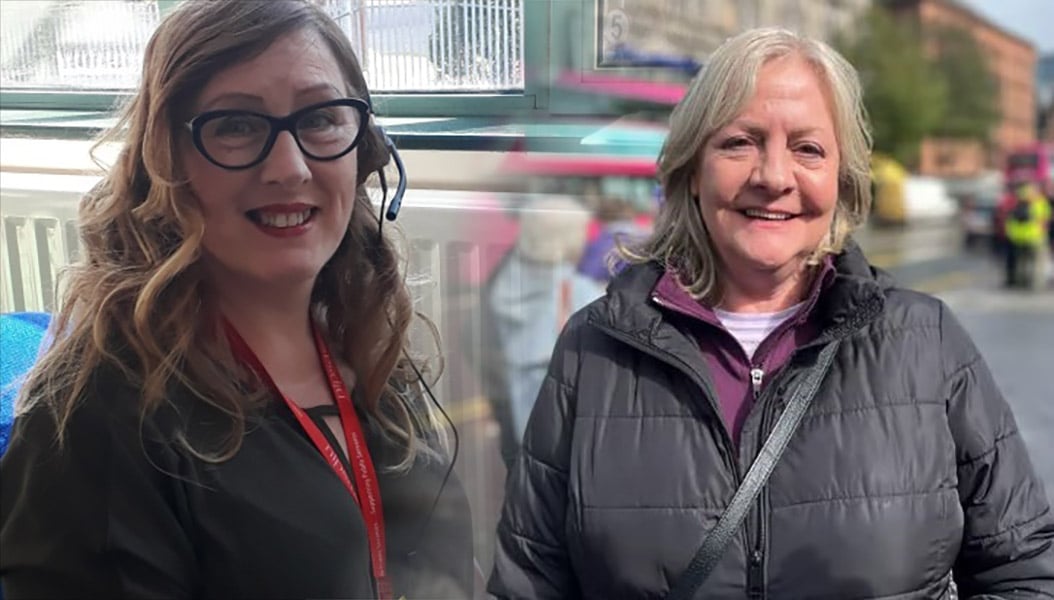
Proceedings at Thursday’s (June 26) board meeting of the Southern HSC Trust were interrupted unexpectedly, as staff working in the field of children’s social work were invited in to air their grievances around chronic staff shortages.
The Trust staff, who are members of trade union Nipsa, had been protesting outside the Trust board meeting at Daisy Hill Hospital, to flag up what they described as dire shortages in the areas of Children’s Social Work, Family Support and Intervention.
General Secretary of Nipsa, Carmel Gates, who had joined the protest, stated at the meeting: “It is, to my mind, one of the most selfless disputes that I have encountered in Nipsa’s history, because this is not a dispute where these individuals have any personal gain.
“They are taking action for what they regard as the preservation of the services that they are part of and that they work in.
“They’re here to highlight the fact that there is a resource crisis, and the importance of safe staffing, and for them as healthcare workers, the issue is very close to their hearts.
“I know everybody will say that we’re not asking them to work more than the hours they’re paid for, but if they weren’t, they probably couldn’t live with themselves, and at-risk children would be in a much more vulnerable position.
“It’s only because of the selflessness of these workers that we haven’t had a fatality as a result of a lack of resources.
“When [members of the] public see in the garden next door a child being beaten and battered by a family member, they call Child Services and they report it.
“There’s an expectation that there will be somebody to preserve that child’s life that day. [Yet] I’ve been told that that family might go on a waiting list, depending on what length the waiting list already is.
“I know that there are more resources promised. Those resources concern me, because we have young social workers in the last year of training, and they’re coming into the service.
“They’re supposed to be managed through a process to ensure that they know what they’re doing, and they can cope with the work, often because of the pressures.
“They’re not receiving the support and mentoring they need, and are dealing with more complex cases than they might otherwise be dealing with.
“My concern is that we’re going to drive them out of the service. We’re going to send all of these workers to social work jobs in other parts of these islands, or out of Health & Social Work altogether, into social work jobs or other commensurate jobs in other parts of the public services, because they can no longer cope. “
Nipsa branch secretary, Gerardette McVeigh explained morale was at an all-time low among social workers: “Social workers are so dedicated they don’t want to show that devastation that we have within our social work, especially within Children’s [Services] as we have at this moment in time.
“Our social workers are doing the job of two, maybe three social workers at one time, and they’re doing that because they have the dedication, they have that duty of care to the young people and families they work with.
“But part of my role is to ensure that our Trust shows that duty of care to them on the ground. This is the last straw. I could have had the whole of [the] childcare [team] out today and more, because my phone has been red hot.
“I’m here in a plea to ask, please listen. Please help our social workers to get what they need. They’re working weekends. They’re working at night, and that’s always in their heads as well, [wondering] ‘Have I done enough?’, because they’re fire-fighting constantly.”
Paul Hughes, who has been working in the field of social work for many years, said he feared the worst for some of the vulnerable children his colleagues are in charge of, for lack of staff to support them.
He stated: “I’m a social worker in the Court Children’s Service, but I had worked in the Child Protection Team for 15 years.
“I’ve been a social worker for almost 20 years now, and the same issues are still there, staff retention, recruitment, and we’re working with very vulnerable groups, at-risk children, and there’s been a lot of pressure put on staff, very inexperienced staff too.
“I think the butter is spread too thinly on the bread, and has been for a long time. But by the grace of God, a child hasn’t come to a severe incident, but my expectation is, I think it’s inevitable that sometime that will happen.
“And I think that weighs heavily on staff, because you know that you’re carrying heavy case loads with a lot of responsibility. You’re the person on the ground working with these children and you know the risks that are there. You know what can happen. That’s a heavy burden to carry for staff.
“You’ve staff coming in very inexperienced. Sometimes some of those staff may have only been there for two or three years. They’re dealing with very complex cases, mental health, drug addiction, substance issues, dealing with very complex court processes as well.
“It takes a long time to build up that level of experience in the team to cope with those sorts of issues. And in a lot of teams that level of experience isn’t there, and that’s because of retention and recruitment problems that have existed for a long time, 10-plus years.”




